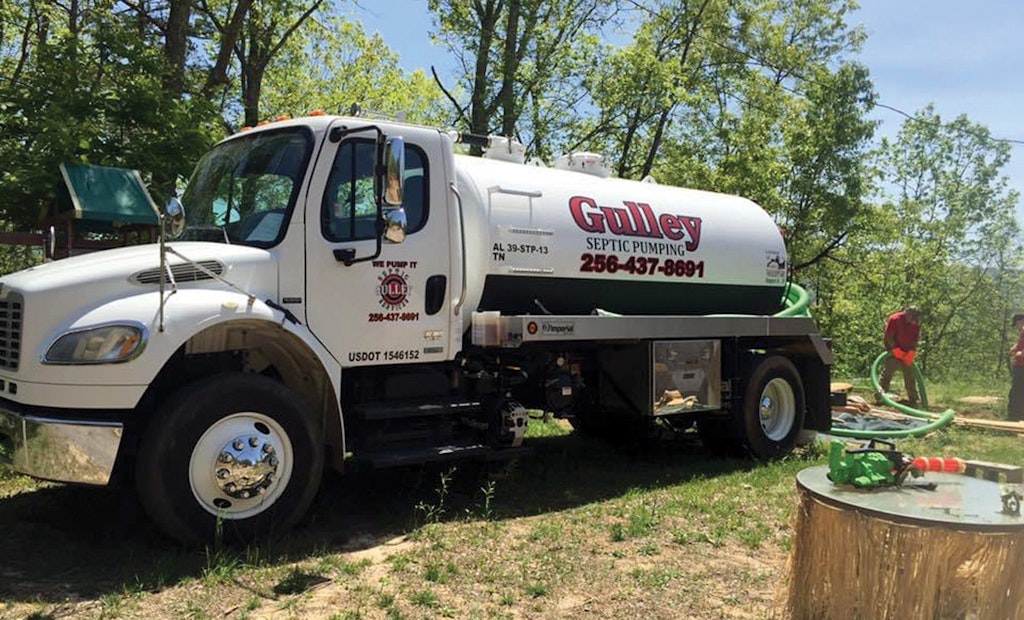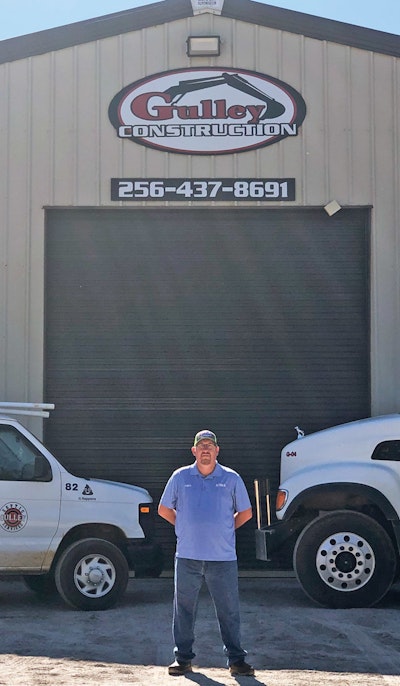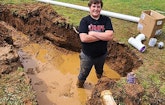
Pumping is done using a 2008 Freightliner M2 with an Imperial Industries 2,500-gallon steel tank and National Vacuum Equipment Challenger 607 pump.
In Snapshot, we talk to a member of a state, provincial or national trade association in the decentralized wastewater industry. This time we visit a member of the Alabama Onsite Wastewater Association.
Name and title or job description: Chris Gulley, president and chief executive officer
Business name and location: Gulley Septic Services and Gulley Construction, Stevenson, Alabama
Services we offer: Septic pumping, installation and inspection; site prep, general excavation and hauling. I hold every license offered in Alabama and Tennessee. I’m also a distributor of Infiltrator, Liberty and Myers pumps products.
Age: 47
Years in the industry: I’ve owned and operated this business for 21 years, but I grew up in the industry. When my daddy retired as a bridge builder, he did excavation work and installed septic tanks, so I did that as a kid. Then I took a break, went into the military and then worked as director of safety for a trucking company. I came home two years after my father passed away in 1998 and had to start the business up from scratch.
Association involvement: I’ve been in the Alabama Onsite Wastewater Association for 15 years. I’m the District 2 representative and have been on the board of directors for three years. And I’m the founder and chairman of the association’s Helping Hands Across Alabama program that puts in free septic systems for needy people. We generally do at least five per year. We give the participating contractors continuing education credits for the year. I’m also the chairman of the Alabama Onsite Wastewater License Board.
Benefits of belonging to the association: Networking and education are the two big ones. I’m one of the people doing some of the initial training and testing. I’ve hosted some portions of continuing education classes at my facility.
Biggest issue facing your association right now: Legislation overreach is the biggest thing. They just passed legislation to take away anything over 15,000 gallons a day out of the Board’s scope and give it to the general contractors.
Our crew includes: Jana Butler and Miranda Weaver work in the office. In the field are Brandon Hubbard, operator; Shambo Thompson, foreman, operator and installer; Melvin Smith, operator and truck driver; Josh Lusk, operator and truck driver; Jerry Houser, operator and installer; Larry Humphrey, foreman, operator and installer; Rodney McCrary, operator; Drake Smith, laborer and assistant installer; Mike Bias, vacuum truck operator; Jamie Huckaby, laborer; and Josh Brooks, part-time truck driver. My 15-year-old son, C.J. Gulley, works with me when he is not in school.
Typical day on the job: I come into the office and get everything lined up and get the guys going for the day. I do estimates and diagnose problems. My forte is our line clearing and jetting, so I do a lot of that. I help the septic guys fill orders. I do the pump sizing for contractors. I mentor several new installers that went through training with me, and I spend a lot of time on the phone with them or go out to their jobs and help them problem-solve and teach them how to do new things. Some guys call me almost every day with questions. I try to do a lot in education and helping other contractors.
The job I’ll never forget: We were doing a clearing job and septic install in Langston on the water. There was a little old lady in a trailer next door and she came out with a butcher knife and chased the bulldozer around, trying to cut the steel tracks because she said she couldn’t stand the sound. The police came and took her away. She had some kind of mental illness. They brought her back that afternoon. The next day when we fired the dozer up, it went down. She had stuffed a plastic bag in the hydraulic tank and it ruined $15,000 worth of hydraulic pumps on a brand new dozer.
My favorite piece of equipment: I have a John Deere 244J articulated wheel loader. We can put forks on it, a bucket, an auger, a Harley rake. I use it to feed dirt through my dirt screener. It’s the most universal machine I have. We use it every day around the yard and we take it to jobs.
Most challenging site I’ve worked on: We did some work for a mountaintop development in Jasper, Tennessee. It was full of rock and steep terrain, and there were some very tight soils so we had to do some low-pressure pipe systems up there. It was such a steep grade the excavator would slide down the hill. We took the John Deere skid-steer and chains and held the excavator in place while we dug across. And we couldn’t use the skid-steer to put the gravel in the trenches so we had to dump the gravel and then take shovels and fill the trenches by hand.
Oops, I wish I could take this one back: A biodiesel plant closed with 20,000 gallons of grease to dispose of. They had me come in and build Arizona Department of Environmental Management-approved cells to a holding pond to put the grease in. We had it engineered, built the pond, put the grease in and hauled in wood chips to cover it. We had to keep it stirred and monitored for two years. It was supposed to turn into topsoil. Then the company went bankrupt and never paid us.
The craziest question I’ve been asked by a customer: We opened up a tank once and found a full-sized basketball in there. The customer wanted to know how it got in there. I have no idea. It had to go through a drain.
If I could change one industry regulation, it would be: In Alabama we have a state pumper license, but you also have to permit each vacuum truck in each county you pump in. I would change that to being statewide, like it is in Tennessee.
Best piece of small business advice I’ve heard: This came from my daddy — do something in life that nobody else wants to do and you’ll always be successful.
If I wasn’t working in the wastewater industry, I would: Be in education. I’d teach for the onsite wastewater industry. I just bought a building and I’m going to build an education center.
Crystal ball time – This is my outlook for the wastewater industry: I hope that we will be utilizing new technologies to do more innovative systems that are cleaner, for a greener environment. And we need to focus on advanced training for the onsite providers to professionalize the industry more.







